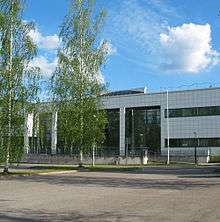Lappeenranta-Lahti University of Technology LUT
LUT University (Lappeenranta-Lahti University of Technology LUT) was established in 1969 in Finland. The university's Lappeenranta campus is situated on the shore of lake Saimaa – the 4th biggest lake in Europe. LUT University's second campus is in Lahti.
LUT-yliopisto | |
| Motto | Land of the curious |
|---|---|
| Type | Public university |
| Established | 1969 |
| Chairman | Tuomo Rönkkö |
| Provost | Liisa-Maija Sainio |
| Rector | Juha-Matti Saksa |
Academic staff | 556 (2018) |
Administrative staff | 370 (2018) |
| Students | 5200 (2018) |
| Location | , 61.06456°N 28.09024°E |
| Website | http://www.lut.fi/en |
Since 2014 LUT University has been ranked among the world’s top 600 universities (Times Higher Education and QS rankings) as well as one of the world's 20 most promising and rapidly developing challenger universities (a report by the Firetail[1] consulting firm).
There are about 930 staff members and 5,200 students in the university. LUT awards the following degrees: Bachelor of Science (Econ), Bachelor of Science (Tech), Master of Science (Tech), Master of Science (Econ), Licentiate of Science (Econ), Licentiate of Science (Tech), Doctor of Science (Tech), Doctor of Science (Econ), and Doctor of Philosophy.
LUT University has several internationally accredited Master´s programmes. Master's degree programme in International Marketing Management was awarded EFMD`s EPAS-accreditation for five years in 2012. EUR-ACE and ASIIN-accredited programmes LUT University has in Chemical Engineering, in Energy Technology, in Environmental Technology, in Mechanical Engineering, in Electrical Engineering and in Industrial Management.
LUT University is state run and state funded.
History in brief
Combining technology and business, LUT University (in Finnish: until 2003 Lappeenrannan teknillinen korkeakoulu, LTKK, and from 2003 Lappeenrannan teknillinen yliopisto, LTY) has served as an academic forerunner since 1969. In the 1950s and 1960s, the Finnish government made plans to establish the University of Eastern Finland in Lappeenranta, but it was ultimately decentralized in three cities: Lappeenranta, Kuopio, and Joensuu. Only the departments of engineering were located in Lappeenranta at that time. The Department of Business Administration was established and teaching of economics began in 1991.
Organisation
Board
- Chairman Tuomo Rönkkö, CEO of Maintpartner Group
- Vice-chairman Teresa Kemppi-Vasama, Chairman of Kemppi Oy
- Kimmo Rauma, Vice President, Danfoss Power Solutions, Electrics
- Ilkka Salonen, CEO East Office of Finnish Industries Oy
- Liisa Rohweder, Secretary General, WWF Finland
- Aki Mikkola, Professor, LUT
- Mari Kallioinen, Associate Professor, LUT
- Paavo Ritala, Professor, LUT
- Henri Antikainen, Business student, LUT
Rectors
- Rector D.Sc. (B.A.) Juha-Matti Saksa
- Vice Rector (Research) Jari Hämäläinen, Ph.D., Professor
- Vice Rector (Education) Jaana Sandström D.Sc. (Tech.), Professor
Schools and Departments

At the beginning of 2015, the university shifted to an organisation model which does not have traditional faculties and departments. Instead, the university consists of three distinct schools which focus on the following research topics:
LUT School of Energy Systems
- Energy Technology
- Electrical Engineering
- Sustainability Science
- Mechanical Engineering
LUT School of Engineering Science
- Chemical Engineering
- Computational Engineering and Physics
- Industrial Engineering and Management
- Software Engineering and Digital Transformation
LUT School of Business and Management
- Strategy, Management and Accounting
- International Business, Marketing and Entrepreneurship
Research institutes
- Centre for Separation Technology (CST)
- Carelian Drives and Motor Centre (CDMC)
- Centre of Computational Engineering and Integrated Design (CEID)
The Viipuri Prize
The Viipuri Prize, established by the Society for Viipuri School of Economics, is awarded for outstanding achievements in the field of strategy research.[2] The Prize is given every second year to a scholar who is among the most prominent in his or her field of study on a global scale, and whose work powerfully affects the research agenda at LUT School of Business.[2]
The following scholars have been awarded the Viipuri Prize:
- David Teece, University of California, Berkeley (2003)
- James G. March, Stanford University (2004)
- Peter Buckley, University of Leeds (2006)
- Sidney G. Winter, University of Pennsylvania (2008)
- C. K. Prahalad, University of Michigan (2010)
- John Kay, London School of Economics (2012)[3]
- Constance E. Helfat,[4] Tuck School of Business (2014)
Former rectors
- Viljo Immonen, 1969 – 1970
- Erkki Kinnunen, 1971 – 1975
- Niilo Teeri, 1975 – 1977
- Juhani Jaakkola
- Markku Lukka, 1998 – 2008
- Ilkka Pöyhönen, 2008 – 2014
- Anneli Pauli, 2014 – 2016
References
- "The "Class of 2030" - Firetail". Archived from the original on 15 February 2017. Retrieved 15 February 2017.
- "The Viipuri Prize". Lappeenranta University of Technology. Archived from the original on 5 April 2012. Retrieved 11 June 2012.
- "Acclaimed economist John Kay awarded the Viipuri Prize at Lappeenranta University of Technology". Lappeenranta University of Technology. Retrieved 19 July 2012.
- Dartmouth, Tuck School of Business at. "Tuck School of Business - Constance E. Helfat". Retrieved 15 February 2017.
External links
| Wikimedia Commons has media related to Lappeenranta University of Technology. |